Women's FA Cup final: The changing face of the game over 50 years
- Published
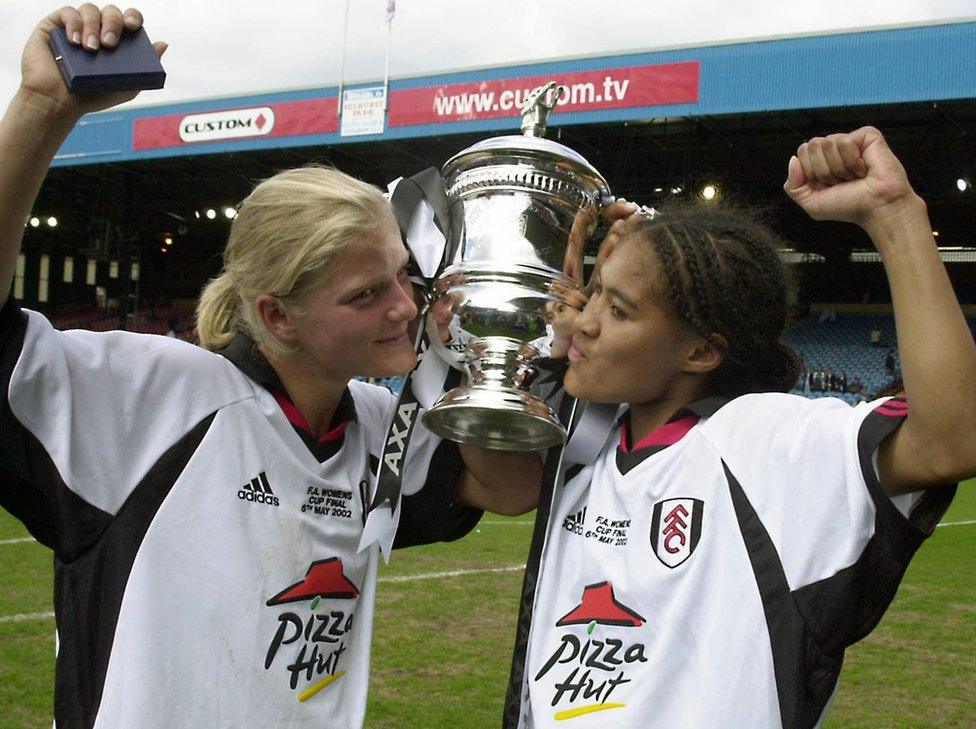
2002 winners Katie Chapman and Rachel Yankey
The Women's FA Cup has come a long way since the first final 50 years ago when Southampton beat Scottish side Stewarton Thistle 4-1.
The 1971 final took place on an uneven pitch inside the athletics track at the Crystal Palace National Sports Centre and was largely ignored by the media.
On Sunday Arsenal and Chelsea - two professional teams packed full of talent - will play at Wembley in front of more than 40,000 fans. Millions more people will be watching the game live on BBC television.
It is perhaps fitting that two London teams will contest the showpiece event as the city has a rich history in the competition, with players from the capital performing a key role in the evolution of the Women's FA Cup.
1970s
Carrie Staley
Wembley 2021 offers a stark contrast to Champion Hill in 1977.
It was at the home of non-League Dulwich Hamlet that year, that Queens Park Rangers beat Southampton 1-0 to become the first London club to win the Women's FA Cup.
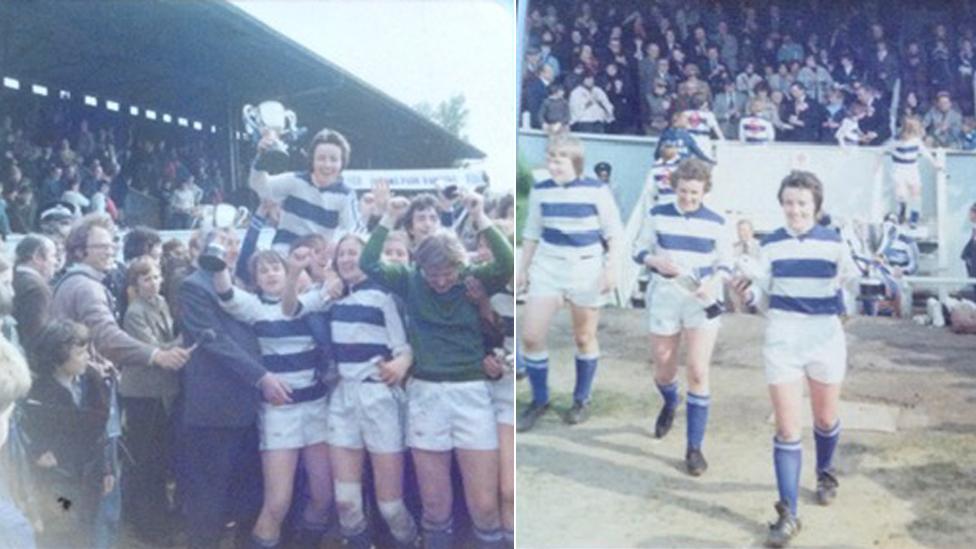
About 3,000 people saw QPR lift the trophy in 1977
"I wish I had been born 20 or 30 years later," says Carrie Staley who scored the only goal.
"I would have loved to have played in an occasion like the Women's FA Cup finals of today."
During the post-match celebrations, Staley was met with a request from a newspaper photographer that no male FA Cup winner has ever faced.
"He asked me to put some lipstick on and kiss the cup," says Staley. "That really wasn't on. We were women playing in a man's world. Sexism was rife."
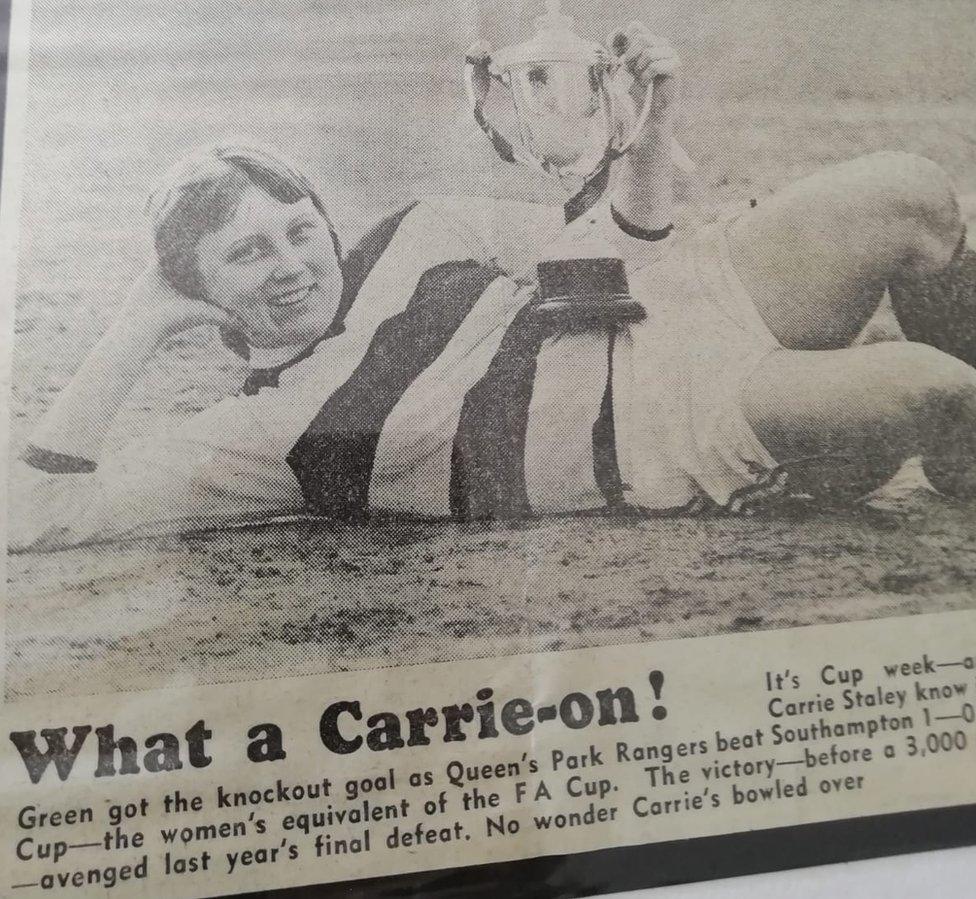
The club was formed by a group of west London women, many of whom supported QPR although they had no formal links to the football club.
Today, QPR are keen to shine a light on the past FA Cup glory achieved in their name.
"It should be celebrated, it will be celebrated," says QPR ambassador Andy Sinton, himself a star player for the men's team in the 1990s.
"It's fantastic what the team did. It's just a shame that at the time the media and society in general didn't properly acknowledge the successes of female players."
1980s
Lori Hoey
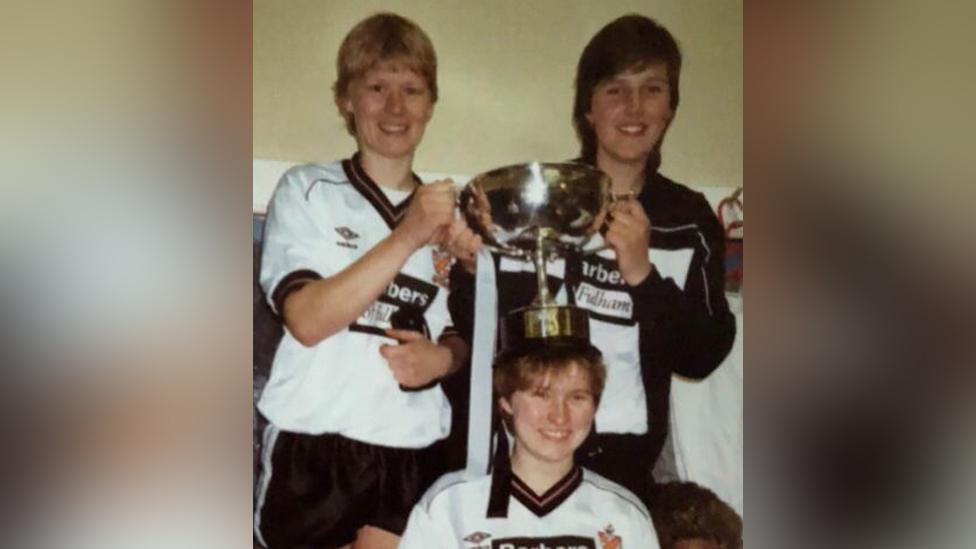
Eight years after QPR's success, Friends of Fulham became the second London club to win the Women's FA Cup.
Defender Lori Hoey won three caps for England, but the cup triumph was the highlight of her club playing days.
"It was tremendous," she remembers. "Winning the FA Cup meant just as much to us as it did to the male players of the time."
By the mid-1980s Football League clubs were agreeing to stage the final having remained unwilling to do so throughout the 1970s.
Friends of Fulham were formed by female fans of Fulham but had no formal connection to the club.
The players were understandably delighted when they learnt the 1985 final was to be held at Craven Cottage.
"It just felt like fate," says Hoey. "We just had to take that opportunity to win the cup and we did."
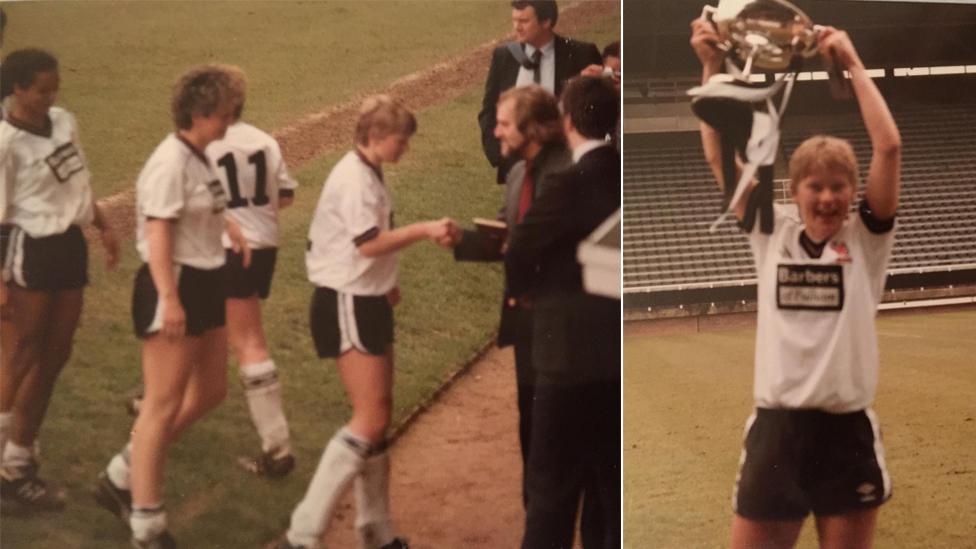
Friends of Fulham beat Doncaster Belles 2-0 in the final with goals from Cheryl McAdam and Cathy Hynes.
Clapham-born Hoey was part of a generation for whom playing opportunities remained scarce.
"I was banned from playing in primary school," she says. "Actually banned - told that I couldn't play football.
"I don't think I realised the enormity of just how unfair that was as a kid. It wasn't going to deter me though. I loved football."
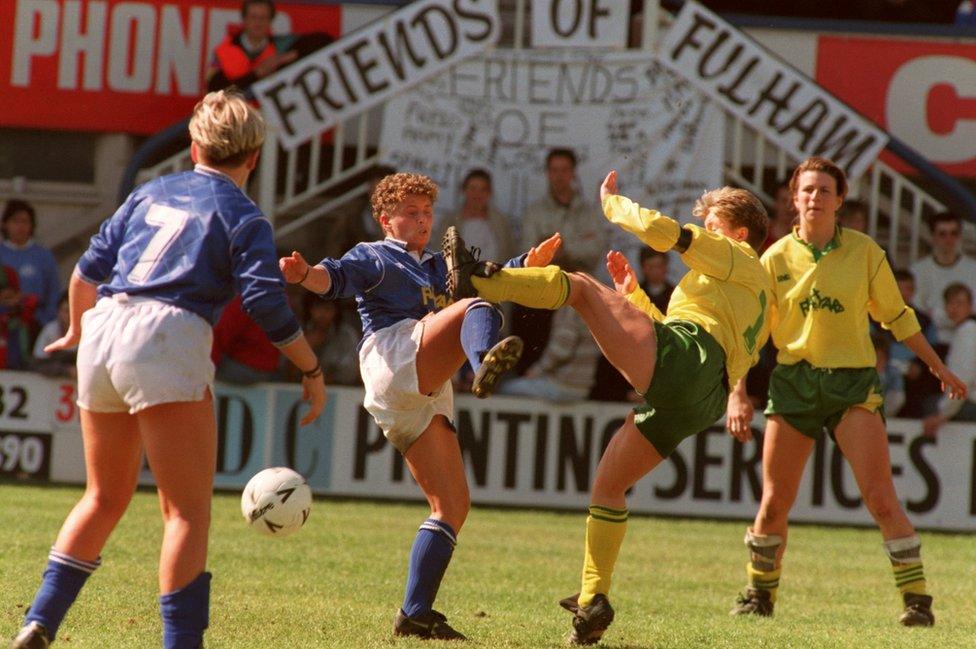
Friends of Fulham, pictured here in 1990, appeared in three finals
Friends of Fulham went on to become Wimbledon Ladies in the 1990s and today AFC Wimbledon club historian Rob Dale is keen the story of their cup glory should live on.
"There's a clear line of continuity from Friends of Fulham to AFC Wimbledon," he says. "What those players achieved in 1985 should never be forgotten."
1990s
Louise Cooper
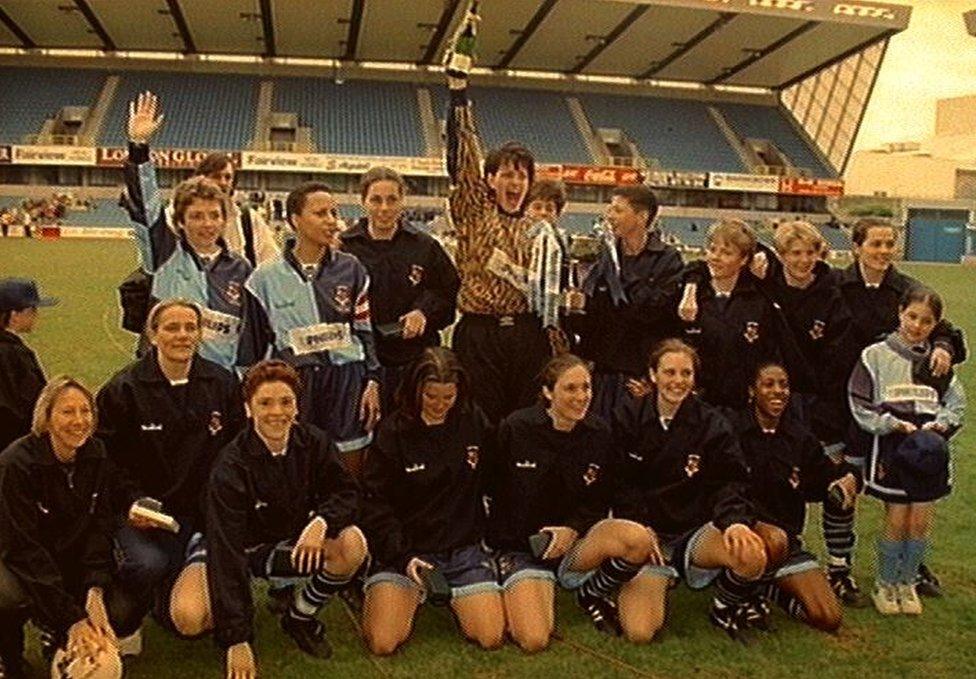
In 1996, Croydon became the first team - male or female - to win the FA Cup on penalties
"I don't think anyone knew we'd actually won, we'd all lost count," says former Croydon goalkeeper Louise Cooper of the penalty shootout that decided the 1996 final.
"I had to ask the ref and when he said, 'Yes, you've done it,' I just set off on a crazy run towards the half-way line to find my family in the crowd. I just couldn't believe it."
The match was watched by only about 2,000 fans at The Den, home of Millwall - but by the mid-1990s the Women's FA Cup final was now being shown live on satellite TV.
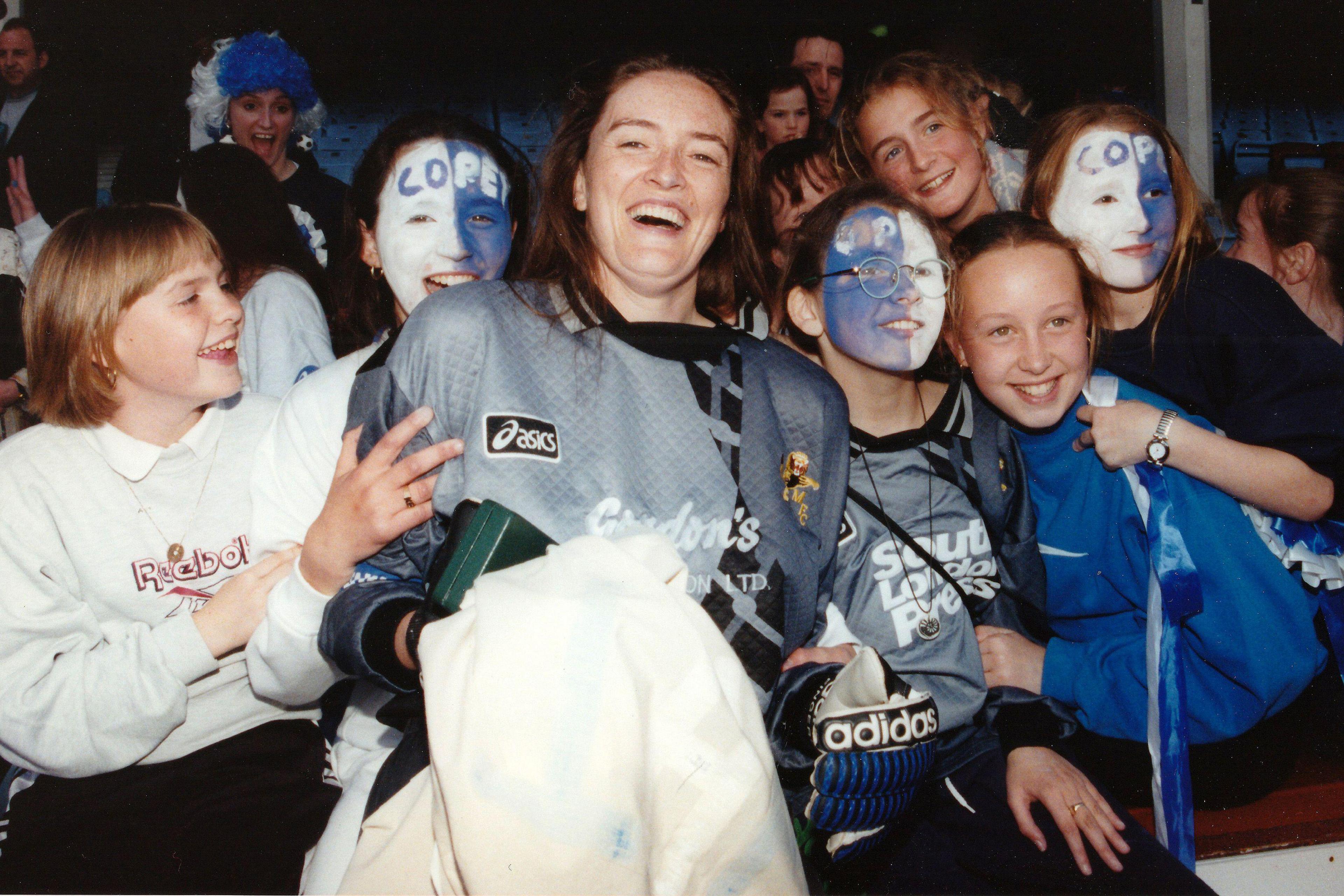
Millwall Lionesses goalkeeper Pauline Cope with fans after beating Wembley at the New Den in 1997
UK Living - a channel which no longer exists today - were the broadcasters in 1996. They were treated to the ultimate televisual spectacle as the final was decided on penalties for the first time.
Liverpool manager Joby Humphries had sent on Gayle Formston with just seconds of extra-time remaining hoping she could score the winning penalty just as she had done against Arsenal in the semi-final.
This time though she was one of three Liverpool players to miss the target as she blazed the last penalty over the bar.
"I always knew where I would put my penalties," says Formston, "But, as I ran up, I noticed that Louise was standing off centre and that put me off."
"It was just a little tactic I had," says Cooper. "And that day it worked. Winning the FA Cup meant everything. I have a photo of me and my mum on the open-top bus parade around Croydon.
"She died in 2001. I always remember finding her in the crowd after the penalty shootout win and just saying to her, 'I did it. I did it'."
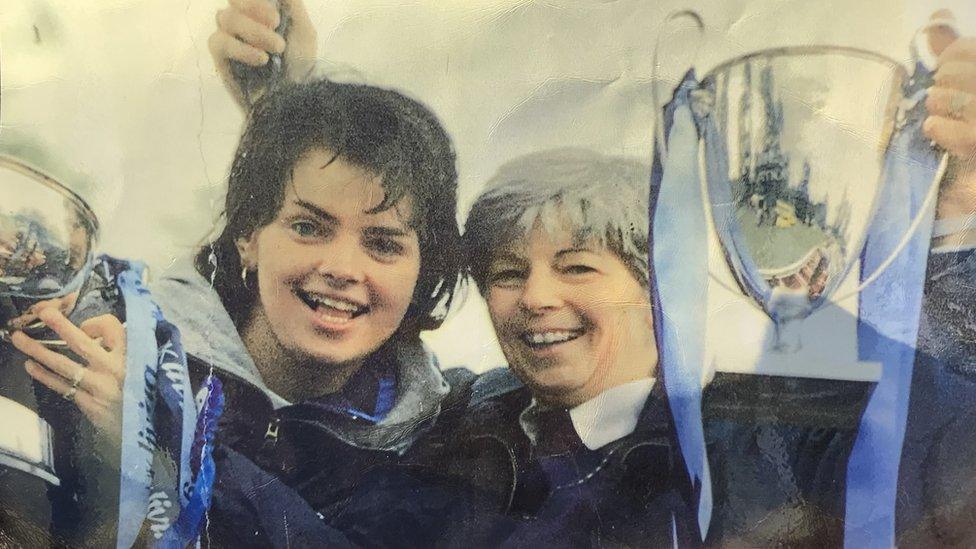
Louise Cooper celebrates the double with her mum
Croydon won the National League title and Women's FA Cup double in 1996 and 2000 before the club was taken over by Charlton.
Charlton - who themselves went on to win the FA Cup in 2004 - do not lay claim to Croydon's honours.
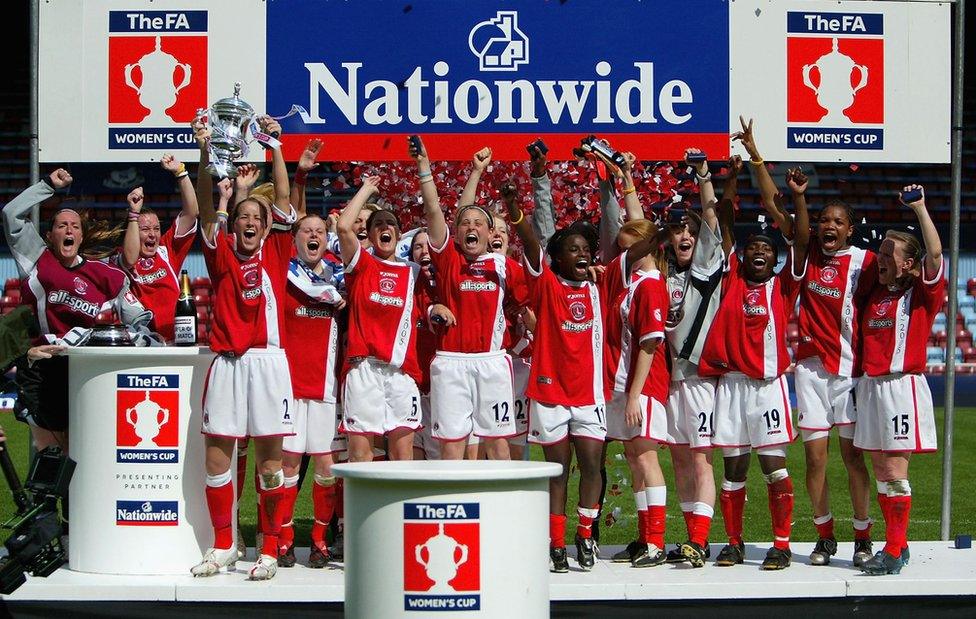
Charlton won the FA Cup in 2004
In 2019 a new Croydon Women's club was set up which considers itself to be a reformation of the two-time FA Cup winners.
2000s
Rachel Yankey
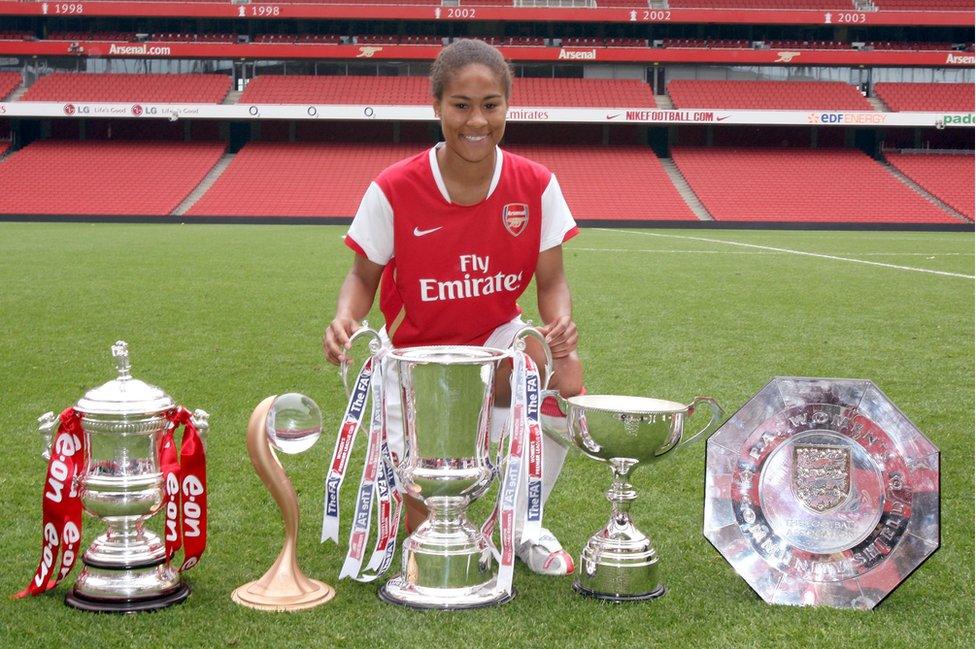
Rachel Yankey pictured in 2007 with the FA Cup, UEFA Cup, League Cup, the Premier League trophy and Community Shield
Her 11 FA Cup wins - an individual record for any man or woman - span three decades.
She won it for the first time in 1998, for the last time in 2014, and during the 2000s Rachel Yankey was almost as much a fixture of the Women's FA Cup final as the trophy itself.
The decade was one of rapid growth in the women's game with the two London clubs Yankey played for in that time - Arsenal and Fulham - at the heart of it.
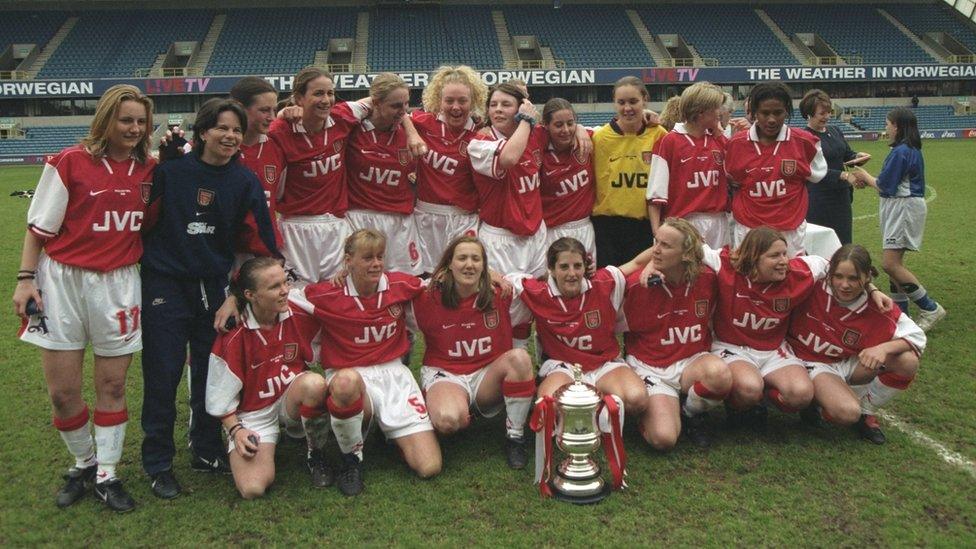
Rachel Yankey (back row, right) first tasted cup success with Arsenal in 1998
"Fulham were the first club in the country to go professional, and Arsenal were pretty much professional in their approach and development of players," says Yankey.
Fulham reverted to part-time status in 2003. It took until 2018 for England to have a fully professional top division.
"Now that the Women's Super League is professional, the high-profile games come round more often but back then it was all about the FA Cup final," she says.
"The FA Cup final, whether it's men's or women's, is just part of the English culture. It meant everything to play in those finals."
Yankey played and scored in the first final to be shown live on terrestrial TV, in 2002, when the BBC cameras were at Selhurst Park as her Fulham side beat Doncaster Belles 2-1.
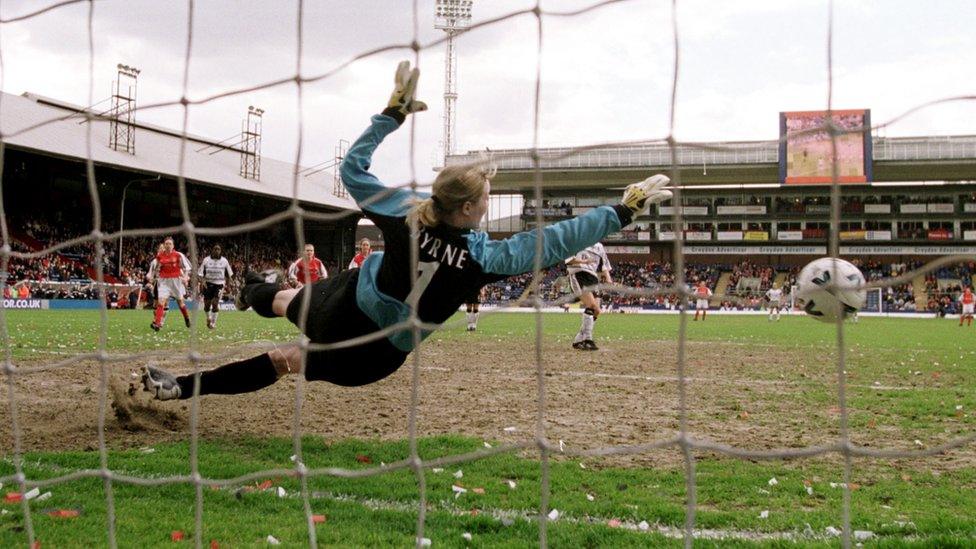
Arsenal goalkeeper Emma Byrne saves a penalty in 2001, the first of three finals at Selhurst Park
The 2000s also saw attendances soar. Three consecutive finals were played at Selhurst Park in front of more than 10,000 fans.
Then, towards the end of the decade came another big leap. Crowds of just under 25,000 watched each of two consecutive finals held at Nottingham Forest's City Ground.
The 24,582 who saw Arsenal beat Leeds United 4-1 there in 2008 remained a record until the Wembley era.
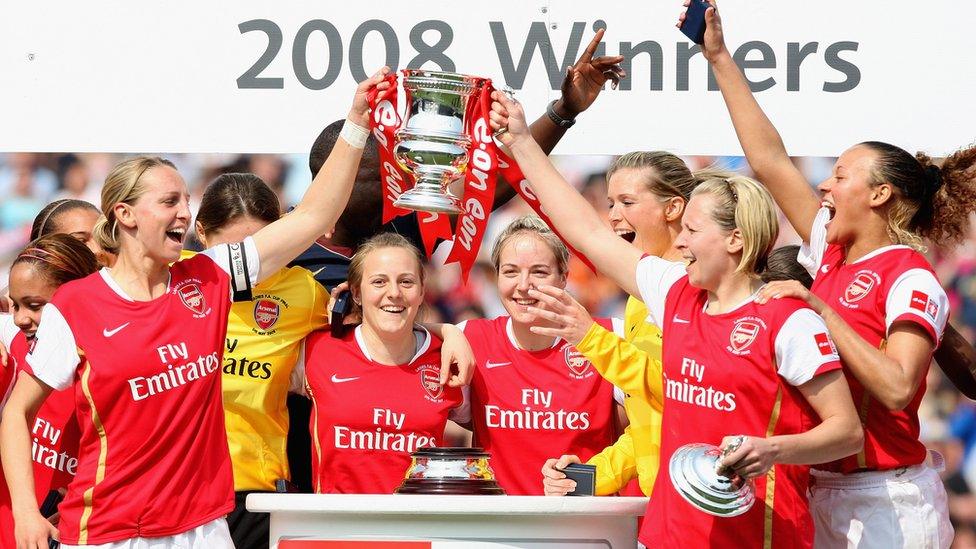
Faye White and Jayne Ludlow of Arsenal leading the trophy celebrations in 2008
"It was fantastic to be playing in front of those big crowds," says Yankey. "The game was beginning to prove itself, beginning to show that there was clearly an appetite for women's football."
2010s
Katie Chapman
"To think about where the final was when I first played in one in 1997 to where it was when I last played in one in 2018 is unbelievable," says Katie Chapman.
Aged 14, Chapman played in front of about 3,000 fans at West Ham United's old Upton Park ground when she was part of a Millwall Lionesses side that beat Wembley Ladies 1-0 in 1997.
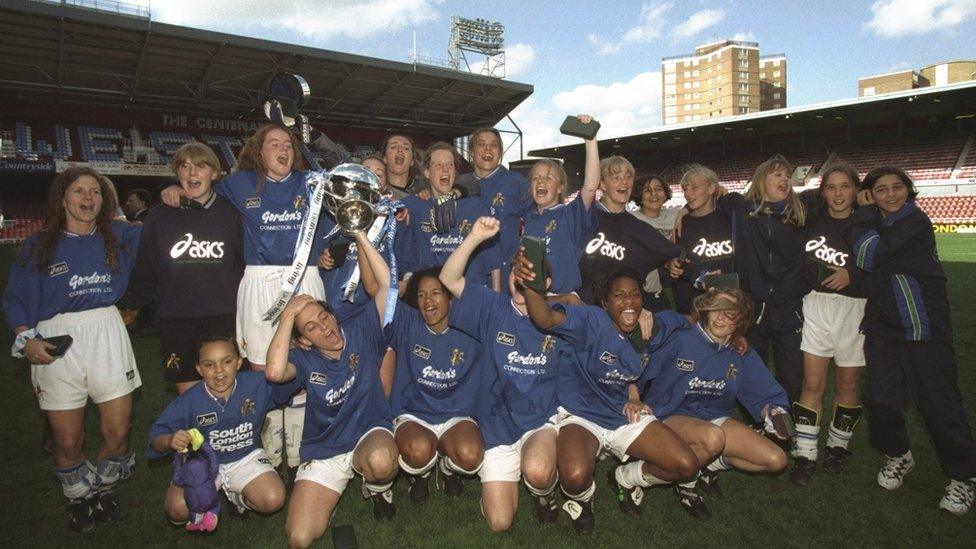
Millwall's cup winning Lionesses in 1997
She went on to win the trophy 10 times with five different London clubs.
Eighteen years after that first success, Chapman became the first woman ever to walk up the famous Wembley steps to lift the FA Cup.
She did so as captain of a Chelsea side who had beaten Notts County 1-0 in the 2015 final after the FA eventually decided the national stadium should host the women's final.
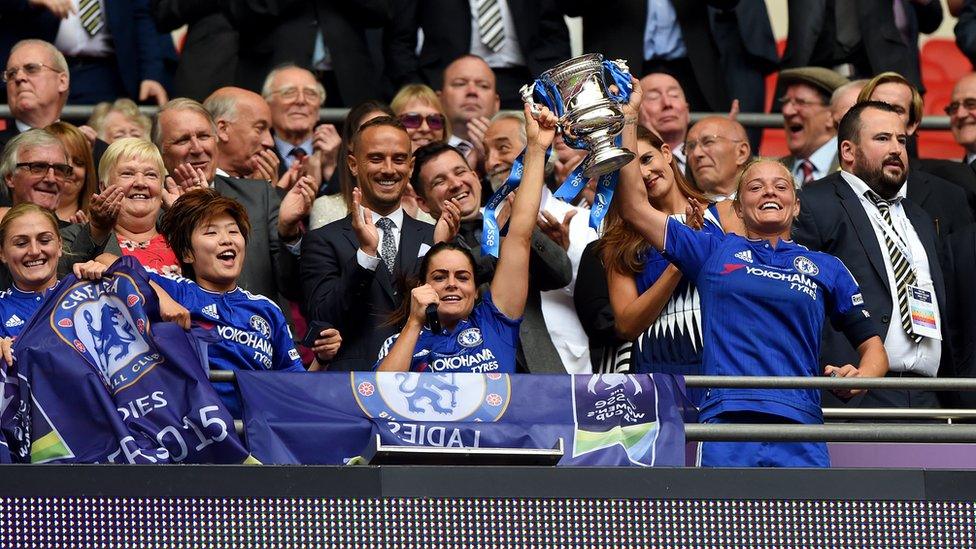
Katie Champman (right) celebrating in 2015
"Before kick-off I knew I could be the first woman to achieve that honour, and that was my inspiration for the day," says Chapman.
"I was absolutely determined that it wouldn't be the other captain walking up those steps."
Chapman's final taste of FA Cup glory came in 2018 when she again led Chelsea to victory at Wembley - this time against Arsenal - before hanging up her boots.
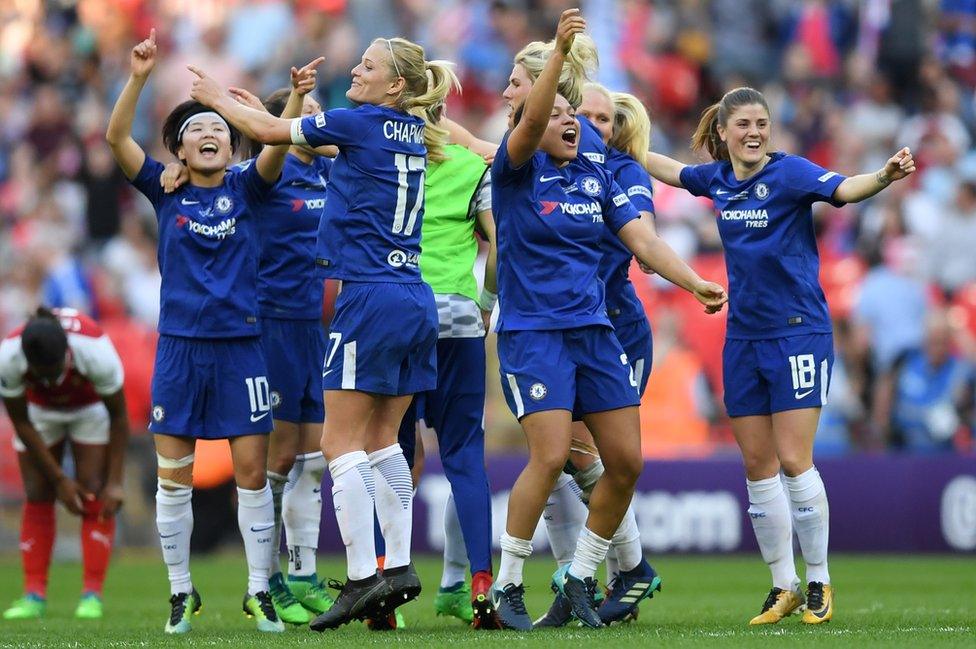
Chelsea celebrate their second FA Cup triumph in 2018
"I'm really lucky that I tasted professional football early on in my career with Fulham, and again towards the end with Chelsea as well as getting to experience the Wembley era of the Women's FA Cup.
"Every player from my generation is aware of what we owe to the players who came before us and our job now is to keep pushing because we've still got a long way to go in the women's game."